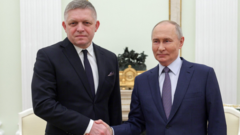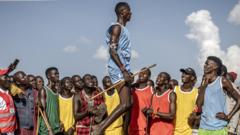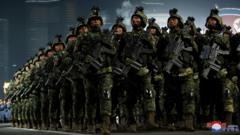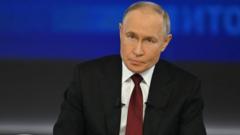A former officer at a Russian nuclear base shares his experiences and claims regarding the heightened state of alert and controversial orders during the Ukraine conflict, shedding light on a rarely discussed topic.
Insights from a Russian Nuclear Officer: Secrets of a Deployed Military Base
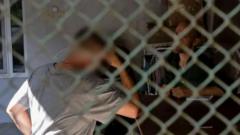
Insights from a Russian Nuclear Officer: Secrets of a Deployed Military Base
An anonymous insider reveals the inner workings and policies of a Russian nuclear weapons facility during the Ukraine invasion, highlighting dissent within the ranks.
On February 24, 2022, the day of Russia's extensive incursion into Ukraine, Anton, an officer in the Russian nuclear forces, recounts how his nuclear weapons base was immediately placed on full combat alert. “Before that, we had only exercises. But on the day the war started, the weapons were fully in place,” he said during an interview at a confidential location outside Russia. To ensure his safety, the BBC has changed his identity and masked his face.
Anton confirmed his role at a clandestine nuclear facility with documentation, though the BBC is unable to verify all his statements independently. He mentioned that on March 27, 2022, amidst escalating military actions, President Vladimir Putin ordered the nuclear deterrent forces into a “special mode of combat service.” Anton emphasized that his unit went to combat readiness right at the conflict's onset and described a life of confinement: “Shut inside the base. All we had was Russian state TV.”
For several weeks, his unit remained on high alert, carrying out strict protocols under a regimented lifestyle. “There is a very strict selection process there. Everyone is a professional soldier – no conscripts,” Anton noted, revealing extensive security measures within these facilities. He further characterized the rigorous screening processes involving lie-detector tests and restrictive conditions that governed soldiers’ personal interactions.
Anton served in a security unit responsible for rapid responses to threats against nuclear weapons, claiming an impressive preparation stance with a mere two minutes for protective mobilization. Russia's nuclear arsenal is notably extensive, with estimates of approximately 4,380 operational warheads.
With recent actions, analysts have raised concerns about the condition and reliability of said arsenal, as some experts argue many weapons are relics of the Soviet era. However, Anton dismissed these assertions as overly simplistic, affirming, “The work to maintain nuclear weapons is constant and never ceases.”
Shortly after the conflict began, Anton received what he termed a “criminal order” instructing him to propagate disinformation about Ukrainian civilians as targets. Describing it as a “red line,” he firmly resisted and faced disciplinary measures that redirected him to a frontline fighting unit, a fate common for other dissenting soldiers, as noted among Russian deserters.
Anton ultimately signed documents refusing further involvement in the war, which led to the initiation of a criminal case against him. He escaped with assistance from a volunteer organization aiding deserters known as “Idite Lesom.” This initiative has noted a surge in soldiers seeking asylum, reaching 350 monthly.
Although he has relocated from Russia, he continues to be pursued by security forces, indicating that contact with former comrades poses severe risks, including potential legal consequences. Anton maintains vigilance while aiding fellow deserters, aware that his resistance could lead to grave retaliation.
Through his narrative, Anton illustrates a perspective on military life during a historically pivotal moment, reflecting how personal convictions clash with duty in a conflict repeatedly examined on the global stage.



